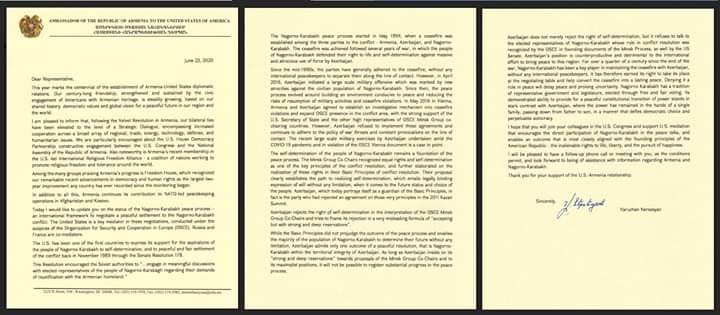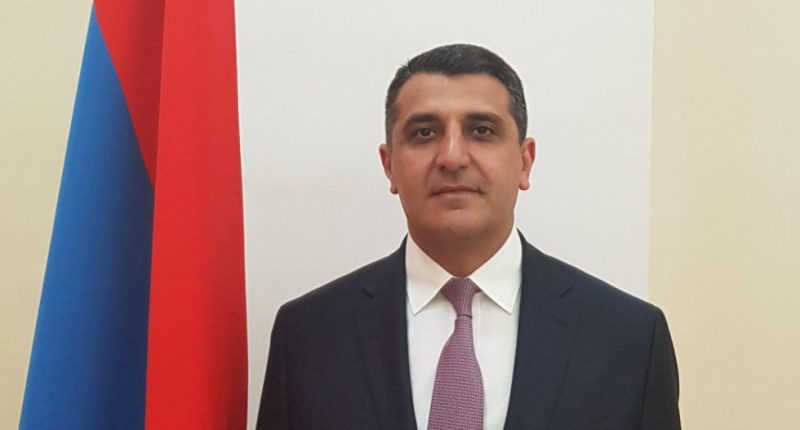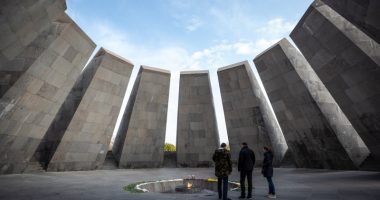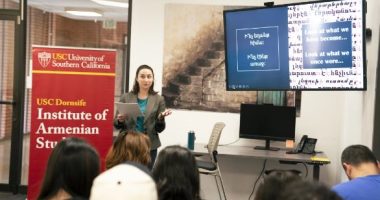WASHINGTON, DC — In a letter addressed to Members of Congress, Armenia’s Ambassador to the U.S. Varuzhan Nerisyan has highlighted the importance of Nagorno Karabakh’s participation in the negotiations.
“Denying it a role in peace will delay peace and prolong uncertainty. Nagorno Karabakh has a tradition of representative government and legislature, elected through free and fair voting,” the Ambassador said.
“I hope that you will join your colleagues in the U.S. Congress and support U.S. mediation that encourages the direct participation of Nagorno-Karabakh in the peace talks, and enables an outcome that is most closely aligned with the founding principles of the American Republic – the inalienable rights to life, liberty, and the pursuit of happiness,” Amb. Nersisyan added.


The full text of the letter is provided below:
Dear Representative,
This year marks the centennial of the establishment of Armenia-United States diplomatic relations. Our century-long friendship, strengthened and sustained by the civic engagement of Americans with Armenian heritage, is steadily growing, based on our shared history, democratic values and global vision for a peaceful future in our region and the world.
I am pleased to inform that, following the Velvet Revolution in Armenia, our bilateral ties have been elevated to the level of a Strategic Dialogue, encompassing increased cooperation across a broad array of regional, trade, energy, technology, defense, and humanitarian issues. We are particularly encouraged about the U.S. House Democracy Partnership constructive engagement between the U.S. Congress and the National Assembly of the Republic of Armenia. Also noteworthy is Armenia’s recent membership in the U.S. led International Religious Freedom Alliance – a coalition of nations working to promote religious freedom and tolerance around the world.
Among the many groups praising Armenia’s progress is Freedom House, which recognized our remarkable recent advancements in democracy and human rights as the largest two-year improvement any country has ever recorded since the monitoring began.
In addition to all this, Armenia continues its contribution to NATO-led peacekeeping operations in Afghanistan and Kosovo.
Today I would like to update you on the status of the Nagorno-Karabakh peace process – an international framework to negotiate a peaceful settlement to the Nagorno-Karabakh conflict. The United States is a key mediator in these negotiations, conducted under the auspices of the Organization for Security and Cooperation in Europe (OSCE). Russia and France are co-mediators.
The U.S. has been one of the first countries to express its support for the aspirations of the people of Nagorno-Karabakh to self-determination, and to peaceful and fair settlement of the conflict back in November 1989 through the Senate Resolution 178.
This Resolution encouraged the Soviet authorities to “…engage in meaningful discussions with elected representatives of the people of Nagorno-Karabagh regarding their demands of reunification with the Armenian homeland.”
The Nagorno-Karabakh peace process started in May 1994, when a ceasefire was established among the three parties to the conflict – Armenia, Azerbaijan, and Nagorno-Karabakh. The ceasefire was achieved followed several years of war, in which the people of Nagorno-Karabakh defended their right to life and self-determination against massive and atrocious use of force by Azerbaijan.
Since the mid-1990s, the parties have generally adhered to the ceasefire, without any international peacekeepers to separate them along the line of contact. However, in April 2016, Azerbaijan initiated a large scale military offensive which was marked by new atrocities against the civilian population of Nagorno-Karabakh. Since then, the peace process evolved around building an environment conducive to peace and reducing the risks of resumption of military activities and ceasefire violations.
In May 2016 in Vienna, Armenia and Azerbaijan agreed to establish an investigative mechanism into ceasefire violations and expand OSCE presence in the conflict area, with the strong support of the U.S. Secretary of State and the other high representatives of OSCE Minsk Group co-chairing countries.
However, Azerbaijan refused to implement these agreements and continues to adhere to the policy of war threats and constant provocations on the line of contact. The recent large scale military exercises by Azerbaijan undertaken amid the COVID-19 pandemic and in violation of the OSCE Vienna document is a case in point.
The self-determination of the people of Nagorno-Karabakh remains a foundation of the peace process. The Minsk Group Co-Chairs recognized equal rights and self-determination as one of the key principles of the conflict resolution, and further elaborated on the realization of these rights in their Basic Principles of conflict resolution. Their proposal clearly establishes the path to realizing self-determination, which entails legally binding expression of will without any limitation, when it comes to the future status and choice of the people. Azerbaijan, which today portrays itself as a guardian of the Basic Principles, in fact is the party who had rejected an agreement on those very principles in the 2011 Kazan Summit.
Azerbaijan rejects the right of self-determination in the interpretation of the OSCE Minsk Group Co-Chairs and tries to frame its rejection in a very misleading formula of “accepting but with strong and deep reservations”.
While the Basic Principles did not prejudge the outcome of the peace process and enables the majority of the population of Nagorno-Karabakh to determine their future without any limitation, Azerbaijan admits only one outcome of a peaceful resolution, that is Nagorno-Karabakh within the territorial integrity of Azerbaijan. As long as Azerbaijan insists on its “strong and deep reservations” towards proposals of the Minsk Group Co-Chairs and to its maximalist positions, it will not be possible to register substantial progress in the peace process.
Azerbaijan does not merely reject the right of self-determination, but it refuses to talk to the elected representatives of Nagorno-Karabakh whose role in conflict resolution was recognized by the OSCE in founding documents of the Minsk Process, as well by the US Senate. Azerbaijan’s position is counterproductive and detrimental to the international effort to bring peace to this region.
For over a quarter of a century since the end of the war, Nagorno-Karabakh has been a key player in maintaining the ceasefire with Azerbaijan, without any international peacekeepers. It has therefore earned its right to take its place at the negotiating table and help convert the ceasefire into a lasting peace. Denying it a role in peace will delay peace and prolong uncertainty.
Nagorno Karabakh has a tradition of representative government and legislature, elected through free and fair voting. Its demonstrated ability to provide for a peaceful constitutional transition of power stands in stark contrast with Azerbaijan, where the power has remained in the hands of a single family, passing down from father to son, in a manner that defies democratic choice and perpetuates autocracy.
I hope that you will join your colleagues in the U.S. Congress and support U.S. mediation that encourages the direct participation of Nagorno-Karabakh in the peace talks, and enables an outcome that is most closely aligned with the founding principles of the American Republic – the inalienable rights to life, liberty, and the pursuit of happiness.
I will be pleased to have a follow-up phone call or meeting with you, as the conditions permit, and look forward to being of assistance with information regarding Armenia and Nagorno-Karabakh.
Thank you for your support of the U.S.-Armenia relationship.










